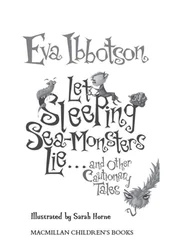‘What was he searching for?’
The professor put down his fork. He seemed to be looking into the distance. Then he said, ‘The giant sloth.’
‘The bones, you mean? The skeleton? Like your rib?’
‘No, the beast itself. He was convinced it wasn’t extinct. The natives have always had stories about it — they call it the Maupugari , a great creature with reddish hair which walks on its curved claws. You get sightings of it every so often.’ He sighed. ‘It was Carruthers who got me interested in sloths — we were friends in Cambridge. And now…’
‘How did he die?’
The professor shrugged. ‘He was searching somewhere in the Matto Grosso and got a fever. It’s not so difficult to die out here. Personally I think they broke his heart.’
Miss Minton waited while he dabbed his eyes with his handkerchief. Then she said, ‘Perhaps it wasn’t such a bad way to go. Still working, still searching… Better than dying in hospital with strangers.’
‘Yes. Yes, you’re right. But I wish…’
Something now occurred to Miss Minton. ‘You don’t think he was right, do you? That the sloth is not extinct. You don’t agree with him?’
The professor blushed. ‘No, no,’ he said. ‘It’s most unlikely.’
But he didn’t meet her eyes.
Miss Minton now gathered up her belongings. ‘I have to fetch Maia from her piano lesson,’ she said.
But when she left the restaurant, she did not go straight to the Haltmanns. She crossed the square, turned down the street to the Keminskys’ mansion, and asked to speak to the countess.
The professor was right about Gonzales. He arrived at the Carters the next day, along with two unpleasant-looking henchmen.
Gonzales was a Brazilian who had traded in the Amazon for many years. He was not a nice man, but he dealt fairly in business and Mr Carter had now exhausted his patience.
Mr Carter took him into the study, but the walls were thin and it was almost impossible not to hear what Gonzales was saying.
‘I’ve had enough,’ he said in Portuguese. ‘Either you let me have what you owe me in full, or I will take legal action.’
Then Carter’s voice, low, whining. ‘I only need a few more weeks. They’re bringing in a big batch of rubber from the north of the estate. It will fetch a good price.’
‘That is not what I have heard,’ said Gonzales.
The voices went on for a while longer: Gonzales’ loud, Carter’s a low mumble. Then Gonzales threw open the door, bowed to Mrs Carter, gathered his henchmen — and was gone.
For two days after Gonzales had come, Mr Carter tried to sort out his papers and his bills. He even went out into the forest, a thing he did not often do, to encourage those workers who were still with him.
But then a little packet came from England, with the greatest prize he had yet seen; a double set of navy blue eyes.
‘They’re from a captain in the French Army. He was blown up in a battle. Look how they match; it’s incredible!’
And he disappeared again into his study and wasn’t seen except for meals.
Mrs Carter had started to write to Lady Parsons in England, covering the paper with her hand when anyone came into the room. She wrote several of these letters and tore them up. But in the end she was satisfied with what she had written, and posted the letter herself in Manaus.
As for the twins, their happiness did not last long. At first they made lists of what they would buy: the dresses, the shoes, the hats, the boxes of chocolate. If Beatrice decided to order a flounced party dress in pink organdie, Gwendolyn decided to order one in blue. When Beatrice thought she would buy some proper scent, Gwendolyn said she was sick of boring lavender water and said she would have some too.
‘You don’t have to copy me,’ said Beatrice crossly, and Gwendolyn looked at her blankly. The twins had always copied each other.
Mrs Carter had asked them to share some of the money with their parents.
‘Your father is having a hard time, girls. I think it would be kind to let the whole family join in your good fortune,’ she said.
But the twins absolutely refused.
‘It’s ours. We need it. We don’t want Maia to have money and not us. We want her to go.’
So now the twins became suspicious, first of their mother, then of the servants.
‘They’re always hanging about,’ they said fretfully.
This was true. Tapi and the others, remembering their promise to Finn, took every chance they could to see that Maia was all right.
Hiding their money became the most important thing to the twins. At night, Beatrice hid her bank-notes in an old doll’s pram which she kept by her bed. Gwendolyn slept with hers under her mattress.
They took the money with them to the lavatory, they brought it into the dining room when they were doing their lessons.
By now they had stopped planning how to spend the money. They just wanted to look at it and count it and gloat over it.
From being suspicious of everyone else, the twins became suspicious of each other. They suspended a piece of cotton between their beds so that one of them couldn’t creep out at night without waking the other. Then Beatrice developed a septic throat and couldn’t go to the dancing class, and Gwendolyn wouldn’t go without her in case her sister stole the money while she was away.
But what worried Maia was not the way the twins behaved. The twins had always been odd. What worried her was the feeling that Minty was hiding something from her. That her governess had a secret.
A few days after Gonzales had come, she knocked on Miss Minton’s door and opened it, to find her kneeling on the floor putting books into her tin trunk.
She looked up quickly and shut the lid, but for the first time Maia felt she was interrupting something private.
‘I’m putting some of these away. I’ve found some ants in the Shakespeare.’
‘They must be really tough ants,’ said Maia, ‘to hold out against Mrs Carter’s sprays.’
‘Ants are tough,’ said Miss Minton, and changed the subject.
But Maia continued to feel uneasy, for she had the feeling that what Miss Minton had been doing was packing .
Oh, Finn, thought Maia, I know I should be glad you’re free and happy, and I am glad. Only I really don’t know what to do here any more.
But Finn wasn’t happy. Both he and the boat seemed somehow sluggish — and he couldn’t quite get rid of the knot in his stomach.
He had moored by a huge dyewood tree. The water flowed quietly in a deep channel; nowhere better could be found.
So why? He’d had his supper of beans and roasted maize; the deck was piled with chopped wood; the dog had gone ashore to find his own supper and came back with a smug expression and blood on his jaws.
Everything was fine.
A group of howler monkeys came swinging through the trees, making their evening racket, half-screech, half-laughter, and stopped when they saw the Arabella .
‘Perhaps I should have gone to Westwood,’ thought Finn. ‘They’d have knocked all this rubbish out of me. Foreseeing disasters…’
What did he think could happen to Maia in the Carters’ bungalow? The whole point about the Carters’ bungalow was that nothing happened in it. It was the most boring house in the world — and the Indians had promised to look after her. ‘No harm will come to your friend,’ Furo had said.
So why did the unease get worse all the time?
He remembered saying goodbye to Maia. She had come out of the house in her dressing gown; she ran so lightly, but when he’d hugged her she felt wonderfully solid.
No, Maia would be all right.
‘I’m not going back,’ said Finn aloud — and in the trees, the monkeys threw back their heads and roared with laughter.
Читать дальше












